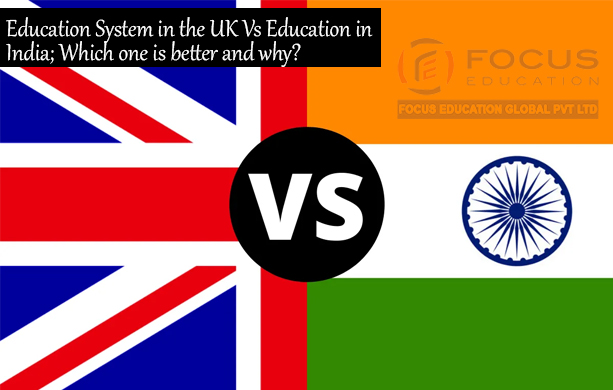Education System in the UK Vs Education in India; Which one is better and why?
In today’s globalized world, where education plays a pivotal role in shaping individuals and societies, the comparison between the education systems of different countries holds significant importance. Among the myriad of comparisons, one frequently surface is the contrast between the education systems of the United Kingdom and India. Both nations boast rich histories and diverse cultures, yet their approaches to education vary significantly. In this blog, we will explore the distinctions between the Education Systems of the UK and India, highlighting the advantages and differences that students should consider when making educational choices.
Understanding the Education Systems
The education systems of the UK and India exhibit unique characteristics tailored to their respective socio-cultural and economic contexts. In the UK, education is primarily divided into four stages: primary education, secondary education, further education, and higher education. The system emphasises critical thinking, creativity, and independent learning, strongly focusing on research and innovation. On the other hand, India’s education system follows a structure comprising primary education, secondary education, higher secondary education, and tertiary education. Traditionally, Indian education emphasizes routine learning although efforts are being made to integrate more holistic and practical learning approaches.
Curriculum and Pedagogy
One of the key distinctions between the UK and Indian education systems lies in their curriculum and pedagogy. The UK education system offers a more flexible curriculum, allowing students to choose from a wide range of subjects and tailor their education according to their interests and career aspirations. Additionally, the pedagogy in the UK emphasizes interactive teaching methods, critical analysis, and practical application of knowledge.
In contrast, the Indian education system often follows a more rigid curriculum, with a prescribed set of subjects and limited flexibility for students to explore diverse fields. However, recent reforms aim to introduce more flexibility and choice in the curriculum, encouraging interdisciplinary learning and skill development.
Opportunities for Higher Education
When it comes to higher education, the UK is renowned for its prestigious universities and world-class academic institutions. The country attracts students from around the globe due to its diverse range of courses, renowned faculty, and cutting-edge research facilities. Moreover, studying in the UK offers international students an exposure to a multicultural environment and valuable networking opportunities.
While India also boasts several esteemed universities and colleges, the competition for admission can be intense, particularly in top-tier institutions. Additionally, Indian universities are increasingly focusing on enhancing research infrastructure and international collaborations to improve their global rankings and attract foreign students.
Placement and Scholarship Opportunities
One of the significant advantages of Studying in the UK is the plethora of placement and scholarship opportunities available to students. Many universities have strong ties with industry partners, facilitating internships, placements, and job opportunities for graduates. Moreover, numerous scholarships and financial aid programs are offered to international students, making UK education more accessible and affordable.
In India, while placement opportunities vary across institutions, the growing demand for skilled professionals in various sectors has led to an increase in campus recruitment drives and job placements. Additionally, the government and private organizations offer scholarships and grants to meritorious students, although the availability may vary depending on factors such as academic performance and financial need.
Admission Process and Student Experience
The admission process for Higher Education in the UK typically involves submitting applications through centralized systems like UCAS (Universities and Colleges Admissions Service) for undergraduate programs or directly to universities for postgraduate courses. The process may include submitting academic transcripts, letters of recommendation, personal statements, and, in some cases, standardized test scores.
In contrast, the admission process in India often involves entrance exams conducted at the national, state, or university level, depending on the course and institution. Additionally, securing admission in prestigious Indian universities can be highly competitive, requiring diligent preparation and strong academic credentials.
Conclusion
In conclusion, both the UK and Indian Education Systems offer unique opportunities and challenges for students. While the UK Education System offers a plethora of benefits for students seeking a transformative learning experience. Renowned for its flexibility, innovation, and global outlook, studying in the UK provides unparalleled opportunities to engage with diverse perspectives and cutting-edge research.
With historic universities fostering a rich academic tradition, students can access world-class resources and mentorship, paving the way for personal and professional growth. Additionally, the UK’s cosmopolitan environment cultivates invaluable cultural exchanges, preparing students to thrive in an interconnected world. Ultimately, choosing to study in the UK promises a journey filled with boundless possibilities and the foundation for becoming a leader and innovator of tomorrow.
Focus Education is a British Council Certified Agent headquartered in the United Kingdom. Specializing in guiding students’ inquiries about Higher Education Opportunities in the UK, USA, Canada, and Australia, our expertise lies in offering personalized assistance. We empower individuals to navigate the requirements of universities, especially concerning English proficiency, making the journey of pursuing education abroad more accessible. With our dedicated guidance, students can confidently pursue their academic goals, knowing they have a dependable partner committed to their educational success.



